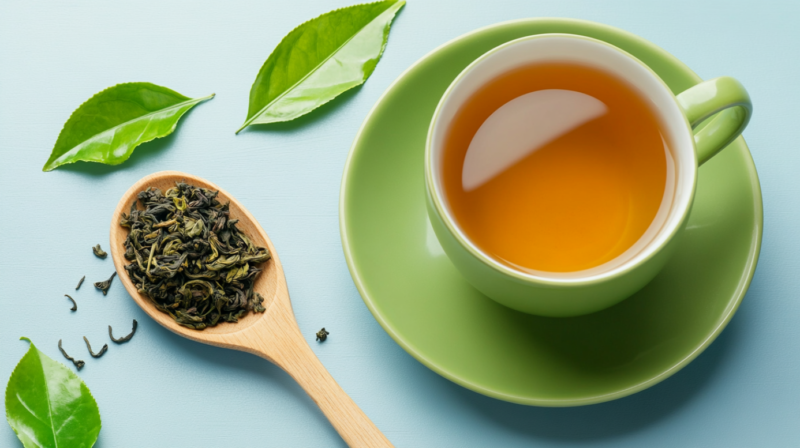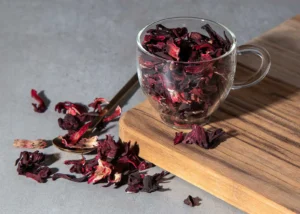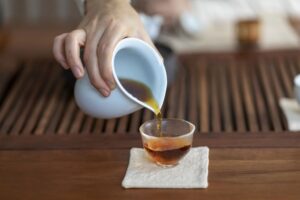Drinking tea during fasting is permissible if it is unsweetened and contains no caloric additives such as milk, sugar, or honey.
Experts in nutrition, medicine, and fasting research agree that plain tea—black, green, or herbal—has minimal calories and does not significantly alter the metabolic state required for fasting.
The suitability of tea depends on the fasting method, its objectives, and the specific tea consumed.
Fasting entails abstaining from food intake for a specified duration. Common methods include intermittent fasting (e.g., 16:8, with 16 hours of fasting and an 8-hour eating window), prolonged fasting (exceeding 24 hours), and religious fasting (e.g., Ramadan or Lent).
The physiological goals typically involve lowering insulin levels to promote fat metabolism (ketosis) and, in extended fasts, inducing autophagy, a cellular repair process.
Maintaining these outcomes requires limiting caloric intake, making evaluating beverages like tea essential.
Caloric Content and Metabolic Impact of Tea
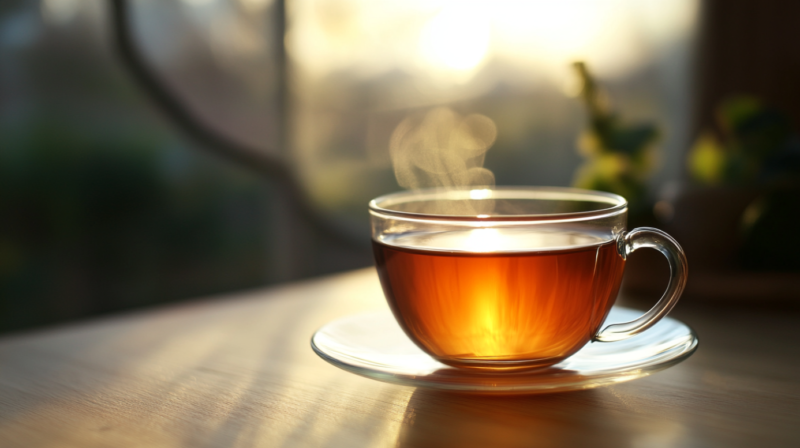
Dr. Jason Fung, a nephrologist and author of The Obesity Code, states that fasting’s effectiveness hinges on minimal insulin stimulation.
“Plain tea has negligible calories—less than 2 per cup—and does not affect insulin levels,” he explains, supporting its use across fasting protocols.
Nutritionist Kelly LeVeque, author of Body Love, adds that tea provides hydration and antioxidants without disrupting fasting, but cautions that “caloric additives like milk or sugar introduce sufficient energy to break the fast.”
A 2018 study in NCBI confirmed that unsweetened tea consumption during a 24-hour fast preserved ketosis, as evidenced by unchanged blood ketone levels. For metabolic fasting objectives, plain tea is deemed compatible.
Tea Variants and Fasting Suitability
The type of tea influences its appropriateness for fasting:
- Black Tea: Containing caffeine and no calories when unsweetened, black tea is endorsed by Dr. Eric Berg, a chiropractor specializing in fasting, for its ability to reduce hunger, a benefit supported by research on caffeine’s appetite-suppressing effects.
- Green Tea: High in catechins, green tea is noted by Dr. David Sinclair, a Harvard aging researcher, for potential autophagy enhancement, though he acknowledges that human studies are lacking and current evidence is derived from animal models.
- Herbal Tea: Varieties such as chamomile or peppermint are generally acceptable, provided they lack added sugars or caloric components. Nutritionist Thomas DeLauer recommends verifying ingredient lists, as some commercial herbal teas contain sweeteners.
- Matcha: With approximately 5 calories per teaspoon, matcha’s consumption of ground tea leaves raises concerns. Dr. Rhonda Patrick, a biochemist, advises against it for strict fasting, particularly when autophagy is the goal.
Experts recommend brewed, unsweetened teas to ensure fasting compliance.
Fasting Objectives and Tea’s Role
The compatibility of tea varies by fasting purpose:
- Weight Loss (Intermittent Fasting): Tea is widely supported. Dr. Mark Ezpeleta, an intermittent fasting specialist, references a 2020 Journal of Clinical Nutrition study indicating that tea consumption improved fasting adherence compared to water alone, likely due to its hunger-reducing properties. She highlights green tea’s fat-oxidation benefits.
- Autophagy (Prolonged Fasting): Autophagy, elucidated by Dr. Yoshinori Ohsumi’s Nobel Prize-winning research, requires extended fasting and minimal calories. Dr. Patrick notes that “any caloric intake may diminish autophagic activity,” advocating water as the safest choice, though she acknowledges black tea’s minimal impact. Dr. Sinclair suggests that tea’s antioxidants may provide ancillary benefits.
- Religious Fasting: Rules differ by tradition. Ramadan prohibits all intake, including tea, during fasting hours. Some Christian fasts permit tea if consistent with the fast’s intent. Compliance with specific guidelines is necessary.
Hydration and Physiological Effects
Fasting reduces water intake from food, increasing the importance of beverages.
A 2019 study in PubMed demonstrated that tea hydrates equivalently to water, refuting concerns about caffeine’s diuretic effects at moderate doses.
Some doctors note that herbal teas may mitigate gastrointestinal discomfort during fasting. However, excessive caffeine can elevate cortisol levels, potentially interfering with fasting outcomes. Also, some experts advise limiting tea to one or two cups within a fasting period.
Considerations and Limitations
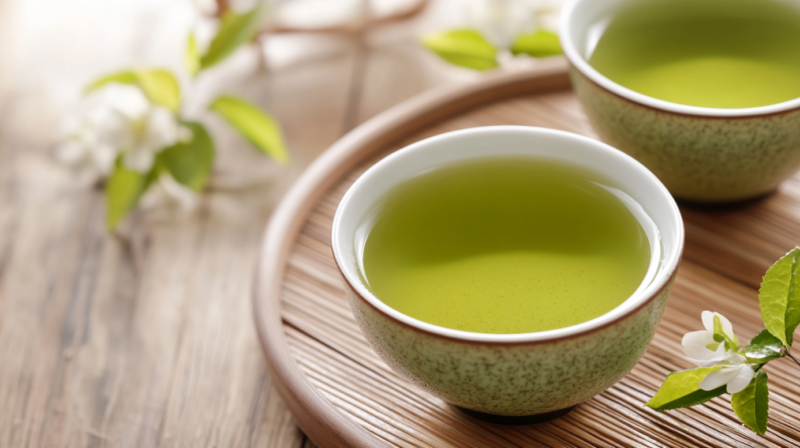
Several factors may affect tea’s compatibility with fasting:
Empirical Observations from Fasting Individuals
Practical examples reinforce tea’s utility. A 35-year-old participant in a 16:8 intermittent fasting regimen reported that black tea reduced hunger during fasting hours, consistent with a 2017 Appetite study on caffeine’s effects.
A 48-year-old individual undertaking 48-hour fasts noted that green tea improved compliance, aligning with Dr. Sinclair’s observation that tea supports fasting persistence.
Tea Alternatives During Fasting
Not everyone tolerates tea well, whether due to caffeine sensitivity, acidity, or personal preference. If tea doesn’t work for you, here are some fasting-friendly alternatives that can support hydration and well-being:
Warm Lemon Water
@healthfood No expensive greens, no supplements, just half a lemon and a cup of hot water✨🍋🍵 start incorporating a cup of hot lemon water into your morning routine and feel your body cleanse itself!🫶 – – The acid in lemons supplement stomach acid levels, which weaken as we age. Following along, it is important to drink a hot beverage while you eat as they aid in digestion, whereas cold beverages slow your metabolism down. Hot lemon water can cleanse the system, boost immunity, decrease bloating and prevent kidney stones💪 – – #health #wellness #guide #breakfast #drink #beverage #hot #lemon #water #journey #immunity #immunesystem #digestivehealth #digestion #cleanse #natural #home #remedies #homeremedies #costefficient #healing #heal #healthfood #healthy #tea #warm #fyp ♬ original sound – estwne
A simple yet effective alternative, warm lemon water provides a refreshing, mildly detoxifying effect without breaking a fast.
The acidity of lemon can aid digestion and help balance pH levels in the body.
It’s also rich in vitamin C, which supports immune function, making it a great choice for those looking for a soothing, caffeine-free option during fasting.
Electrolyte-Infused Water
View this post on Instagram
Fasting, especially for extended periods, can lead to electrolyte depletion, resulting in fatigue, headaches, or muscle cramps.
Drinking electrolyte-infused water helps maintain proper hydration, muscle function, and energy levels. To stay in a fasted state, choose options without added sugar or artificial sweeteners.
A homemade version can be made by adding a pinch of Himalayan salt to the water, which provides essential minerals like sodium, potassium, and magnesium.
Bone Broth (for non-strict fasting)
BONE BROTH
Why you should drink it + how I make it
(Thread) pic.twitter.com/6d9NE7oU0p
— Cooking with Chris (@coookwithchris) September 7, 2021
While not suitable for strict fasting due to its calorie content, bone broth is an excellent option for those who practice modified fasting.
It is rich in collagen, amino acids, and essential minerals that support gut health, joint function, and overall recovery.
Many people incorporate bone broth into their fasting routine, especially during prolonged fasts, to help replenish nutrients without drastically impacting metabolic benefits.
Conclusion
Experts and scientific evidence affirm that unsweetened tea—black, green, or herbal—is compatible with most fasting protocols due to its negligible caloric content and lack of significant metabolic impact.
It supports hydration and adherence, particularly in weight-loss-focused intermittent fasting, and poses minimal disruption in prolonged fasts targeting autophagy, though water may be preferred in strict cases. Religious fasting depends on doctrinal rules.
To maintain fasting integrity, tea must be consumed without additives and in moderation. Dr. Fung concludes, “Tea is a practical and effective option for fasting individuals,” a stance substantiated by research and clinical experience.

